ANTHONY McFadden always dreamed of wearing the Irish green, but it appeared an impossible goal at first.
McFadden was born in Yorkshire, but came ‘home’ to Donegal when he was 12. His father, Paul, and the family relocated to Ards.
It was a place that would be to the forefront of a boxing career that was relatively short, yet storied.
His grandmother in Yorkshire often talked of the family links to John L Sullivan – recognised as the first lineal heavyweight champion of the world in the era of gloved boxing.
McFadden won two Irish titles, a junior and an intermediate, and was beaten in two Irish senior finals before turning to the paid ranks and retiring unbeaten after 11 professional contests. He fought as ‘The Ards Assassin’ during his amateur days and would be under the moniker ‘The Monk’ for the three years he boxed in the pro game.
Based now in Australia, where he owns Rapid Glass in Queensland, McFadden speaks with a real fondness of his time in the squared circle
“Nothing beats the thrill of walking into the ring,” he tells Donegal Daily/Donegal Sport Hub.
“That one-v-one combat; it’s hard to match that adrenaline rush.
“When you retire, there is very little that can match that.
“Everyone who pulls on a pair of gloves and pulls off a nice move or lands a cracker shot knows the feeling. I know it doesn’t sound pretty classy, but we’re primitive at our core, aren’t we? We’re fighting men.”
McFadden overcame Jimmy Vincent at York Hall in April 1999. The win on points after six rounds brought his record to 11-0, 5KOs. It was the last time he’d lace up the gloves.
McFadden was part of Frank Maloney’s stable, which included Lennox Lewis. Maloney’s mother used to cook dinner for McFadden e’very Sunday until, one day, he was gone on his toes to Australia.
“I retired before I got beaten,” McFadden says.
“The business side of boxing was tough. The money wasn’t great. I never went into boxing to just be an opponent. I wasn’t desperate. I didn’t have to do it to feed the family. I loved it, though.
“It was tough. I was working 40 hours a week, jumping in the car, driving an hour-and-a-half to the gym and then maybe not arriving home ’til after 10.
“People always said I’d have done better if I didn’t have the day job – but I couldn’t have lived without it.”
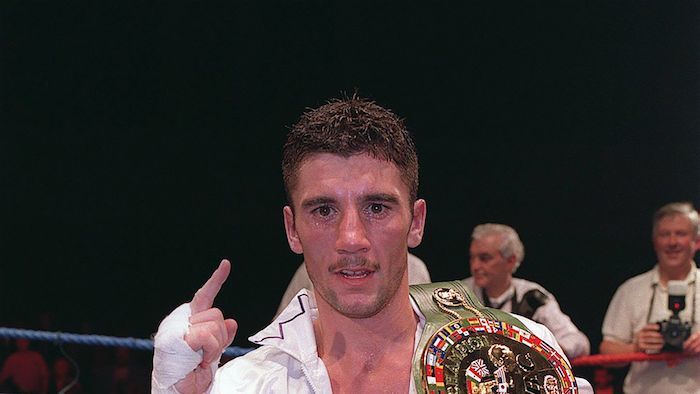
Wayne McCullough
*****
MCFADDEN made his pro debut 24 years ago last month, beating Ernie Loveridge on points at The Point Depot in Dublin.
Headlining the night was Wayne McCullough, who defeated his WBC world bantamweight title with a win over Jose Luis Bueno.
Some years earlier, McFadden shared a room with McCulough, Darren Corbett and Paul Ireland (RIP) while on a trip with Ireland to Czechoslovakia.
“As a plastic Paddy, I fiercely wanted to wear the green,” McFadden says.
He recalls his father bringing teams from Yorkshire to box in the Portnablagh Hotel.
“There were a few epic shows in there with the English teams,” he says.
“Donegal was a hotbed for boxing. Everyone was so interested. I had some of my best nights fighting in the Corncutters Rest in Creeslough and down at the hotel in Portnablagh.
“The local crowds were amazing. Boxing was a great sport to be involved.
“For a lot of young lads, it was an outlet to try and keep out of trouble and I was no different. I wanted to be able to look after myself. I was only average at other sports. I felt I was reasonably good at boxing so I decided to put all of my energy into that.”
He recalls familiar foes, among them Adrian McMenamin from Twins Towns Boxing Club.
“Adrian made me up my game,” McFadden says.
“He tuned me. The first time I beat Adrian, I thought I was a made man. I had beaten the best man about.
“Adrian was classy and he set a bar for boxers like me. I beat Adrian the last time we fought and we’re still in touch. Adrian was a great lad and a lively boxer.
“Adrian gave me a big hiding one night in Twin Towns and that was the night I had to rethink. He landed too many shots on me and dad laid it on the line: ‘Get serious or forget it, this isn’t tennis’. I started out running the next morning. Bruised.”
*****
HE FOUGHT in six tournaments for Ireland, the highlight the gold medal he picked up at a Multi-Nations Tournament in Norway.
“I felt very, very lucky,” he says now, 30 years on.
“I was from a fairly humble background and I was out in Norway fighting for Ireland.
“The place was covered in snow. We were staying in these warm chalets and you’d think there was a load of coal or peat keeping it going, but it was all hydroelectric power. We were like a band of friends, that team.”
Irish boxing was under something of a transformation following the arrival of coach Nicolas Cruz Hernandez from Cuba in 1988.
“He knew his stuff,” McFadden says.
“He elevated Irish boxing. He was responsible for Michael Carruth, Wayne McCullough and a few others. He was really into the science of boxing.
McFadden can recall a trip to Wexford to train and spar alongside Billy Walsh, later the head coach of the Irish boxing team and now working with the USA amateurs. Indeed, Eddie Bolger – head coach of Germany’s amateurs now – was another team-mate.
When he came home from Norway, as with after any of his successes, the fires burned by the roadsides.
“The people of Creeslough and Dunfanaghy used to light fires for me when I won,” he says.
“As a community, it was a credit to them.
“Naturally, I’m a bit of a loner and don’t like too much of a crowd. But that made me feel really good. It was brilliant of them to do that. I did’t mind publicity and definitely didn’t go looking for it.”
He won two Irish finals, beating Tommy Mullen in one of those.
In 2013, Mullen was arrested in Spain after police found €2m in cash and a large quantity of drugs. Mullen was regard as one of Ireland’s most notorious drug dealers and had previously been handed a 15-year prison sentence.
“Tommy was a big strong lump of a lad,” McFadden says of his former foe.
“In hindsight, what was I only a wee innocent lad from Donegal?”
McFadden defeated Martin Carruth – brother of ’92 Olympic gold medalist Michael – in another Irish decider, while he counts Paschal Collins as another opponent he overcame.
His first trip to the National Stadium for an Under-18 Championships, when he was just 16, ended in defeat to Eamonn Magee.
“I can remember the big Maxol signs at the Stadium,” McFadden smiles.
I can still see those yet. It felt a big thing heading up there for the first time. In my first final at 16, I was a complete unknown.
“I was fighting Eamonn Magee. He was something like an eight-time champion and it was my first time. I hit him. I hit him hard. He for the decision, went away to the World Championships in Puerto Rico a couple of months after that and came back with a silver medal. Eamonn was a good operator, crafty in the ring.”
It was a 3-2 split decision defeat to Mark Coughlan in a semi-final soon after when McFadden ‘knew I could hold my own’.
He says: “I always remember that it was like fighting a mature man. I was still a kid and he was muscly, with a hairy chest and stubble!”
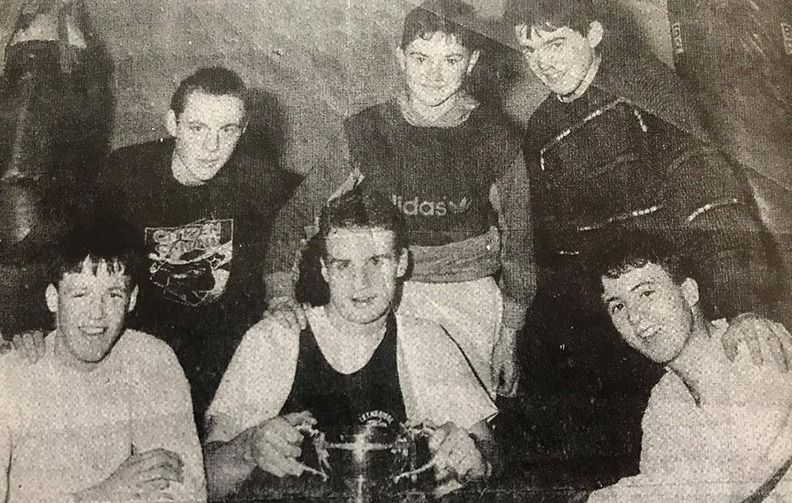
Anthony McFadden after winning the Irish Intermediate title. with John Woods, Joe Harkin, Sean McColgan, Cathal McMonagle and Patrick Durning
*****
‘The Ards Assassin’ was making a name for himself now. A former sparring partner, Danny Ryan, was ready to make the breakthrough, too. Ryan won the Irish middleweight final in 1993, beating Denis Galvin in the final.
At light-middle, McFadden was beaten on points by Holy Trinity, Belfast star Jim Webb.
The following year, it was a similar tale as Webb once again had McFadden’s number.
“Those Belfast boys were always well schooled,” McFadden says.
“Jim was a short, stocky guy who had very good rhythm. Credit to him, over three rounds he beat me.
“I won’t make any excuses.”
McFadden’s prowess was shown as one of his semi-final wins was over Brian Magee – later a four-time Irish middleweight champ.
Boxing was never his number one priority. When he beat Paul McCullough in an Ulster semi-final, he traveled through the night back to England.
He says: “Paul was expected to go through, but I beat him. That night, I dumped into the car – wee Suzuki jeep – and drove across to Larne to get the ferry.
“I drove on down to Yorkshire and stopped in with my grandmother. I stayed there and got a local GAA physio to have a look at my neck. I flew back for the finals.”
In Yorkshire, he was brought up in a traditional Irish community. The roots were important and the GAA was integral against a backdrop of Irish song.
His grandmother, a Kerry woman, had Charlie Nelligan visit with the Sam Maguire.
There were family links to John L Sullivan, the legendary Irish-American heavyweight of the 1800s, who retired with a 47-1-2 record.
Sullivan died against 59. Like most boxers of his era, he did not live a long live and it was said that the effects of prize fighting and a life of overindulgence took a toll.
McFadden was aware of Sullivan’s story as he headed for university in Limerick.
He says: “I took a bit of time off and was at university. Boxing is a brutally tough game. It’s only the one per cent who make it.
“I was fairly good, but I wash’t going to be good enough to get rich from it. When I went to university, I didn’t have the same intensity that I had in Donegal. I mixed study with work, the odd Guinness and other non-monk interests!”
In the mid-90s, McFadden took his leave from boxing and went to Australia for a while.
Down Under, he spared with Grahame ‘Spike’ Cheney, the middleweight silver medalist from the 1988 Olympics in Seoul.
Full-time work beckoned in Australia, but the regular readings of the Boxing News lit a spark in McFadden again. He was homeward bound once more; or, at least, to London, where he joined the stable of Frank Maloney in London.
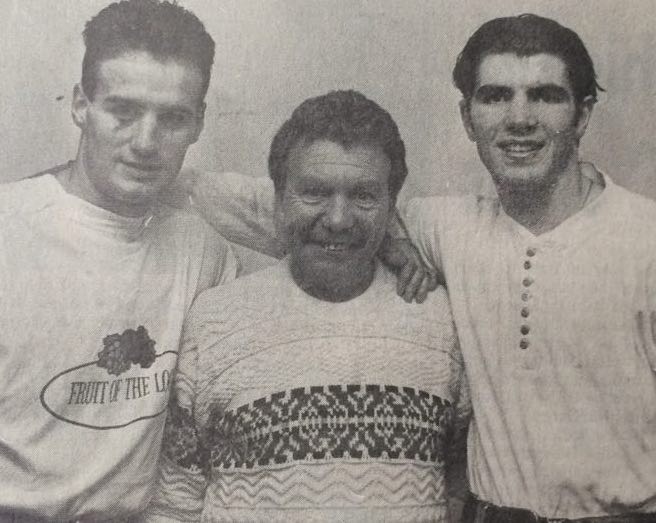
Anthony McFadden (left) with Peter O’Donnell and Danny Ryan
*****
MCFADDEN had a familiar supporter at ringside when he went to war.
He was unmistakable. The plain brown hooded tunic and the long beard marked Brother Edward Dunne out in the crowd.
A member of the Capuchin Order, Brother Edward Dunne was a loyal supporter of his neighbour in Ards.
By now, McFadden was fighting as ‘The Monk’ – a pointer for home.
“I lived only a spit away from the Friary in Ards,” he says.
“Brother Edward was a great friend of the family. I think he possibly just enjoyed the escape. It was a different scenery and he was a great man for the singing.
“I was never a big Church goer, but Brother Edward was a lovely man, just a nice person who loved getting out and he was a great supporter of mine.”
Brother Edward passed away in December 2012.
He was among those in the crowd at the Point when McFaddden defeated Loveridge to kick-start his pro journey.
He says: “When I landed in London, everyone wanted to see what this Irishman was about. I sparred Jason Mathews who had won a version of the world middleweight title.
“I just jumped in and started sparring after I was asked. I wasn’t happy and I came back the next week ready for him.”
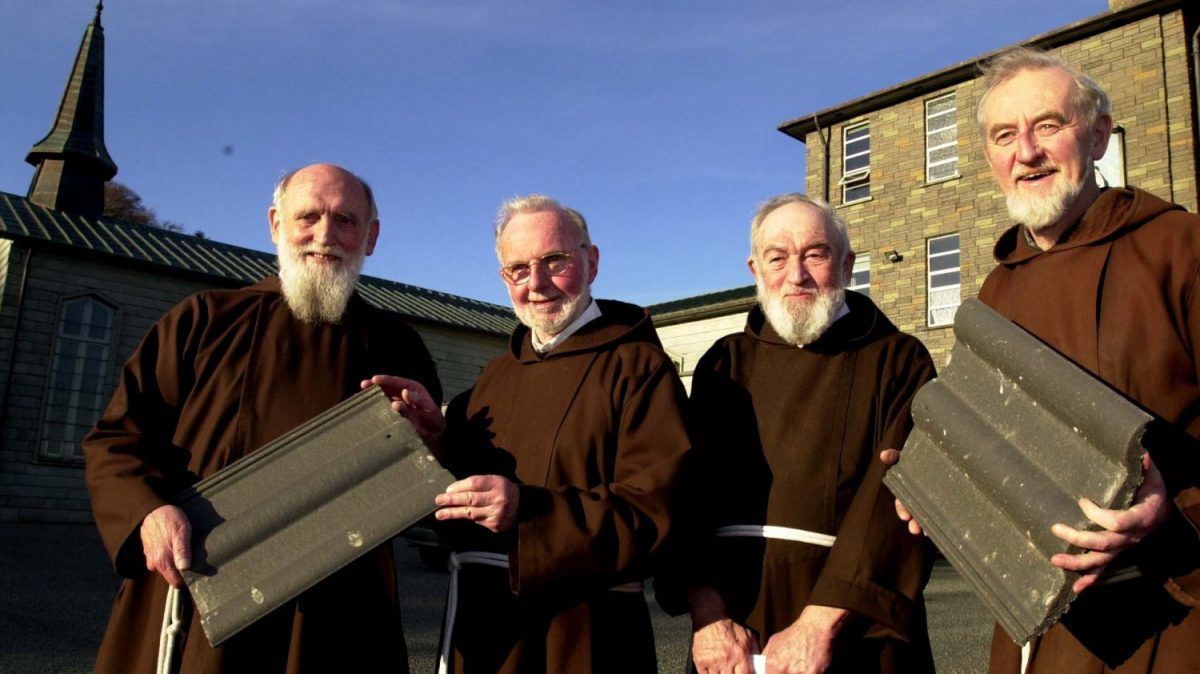
Brother Edward (second from right) with Fr Mark, Brother Kevin and Fr Slyvester. Picture by Brian McDaid
London, though, would offer McFadden further insight into the sport’s sometimes harsh realities.
He got to know Lloyd Honeyghan, who had defeated Donald ‘Cobra’ Curry to win the world welterweight title in Atlantic City.
“He was on top of the world and had the Rolls Royce,” McFadden says.
“When I knew him, he couldn’t break straight and hadn’t a pot to piss in.
“I knew Gilbert Eastman, who was hospitalised with a brain injury he got in a fight.
“I used to spar Audley Harrison and his brother – who died 12 years ago. I actually couldn’t believe that Audley did as well as he did. It’s a tough sport, boxing, and you need everything to go in your favour.”
McFadden fought six times in his debut year, ’96.
He ended 1997 with a points win over Ojay Abrahams – who would KO Webb just a few months later – at the Elephant & Castle in Southwark.
“I had a rough fight with Ojay,” McFadden says.
“He was a journeyman who was just in it for money. He had an ability to really step up and make a huge effort.
“I beat Ojay after eight rounds. I almost had him out on his feet. I had a fair reputation at the time and was well able to look after myself in gym wars, but I just couldn’t put him away.”
*****
WORKING as a quantity surveyor and doubling up as a professional boxer was taking a toll on McFadden, as were some niggling injuries.
However, he went 11-0 with a fine 58-57 win over Jimmy Vincent at Bethnal Green.
It would be the last time McFadden would go through the ropes.
Trained at first by Colin Wilson, for his first few pro fights, he crossed the threshold of one of boxing’s famous doors when he linked up with James Cook, a Jamaican former European super middleweight champion.
The first floor of the Thomas A Becket pub on the Old Kent Road in London was used by the legendary Henry Cooper. The likes of Muhammad Ali, Joe Frazier and Sugary Ray Leonard had sparred there while in England for fights.
It was there McFadden honed the skills he had learned back in Donegal. The work alongside the likes of the Boyles, Harkins, McGinleys, the Woods and Patrick O’Donnell under Hugo Boyle, Mickey Durning and Eddie Harkin.
“I’m approaching 50 and the dedication of Eddie still amazes me,” he says.
“Eddie was brilliant. He coached me from I was 12, all my time during uni I still boxes with him. Mickey Durning was one of the founder members of the club too and he was so dedicated to the club as well.
“I have great memories, too, of training in the woods around Ards. It was like a mini training camp, dad would have a pulley on the trees for me or I’d be pulling rocks. Those are like distant memories now, but it’s great to look back.”
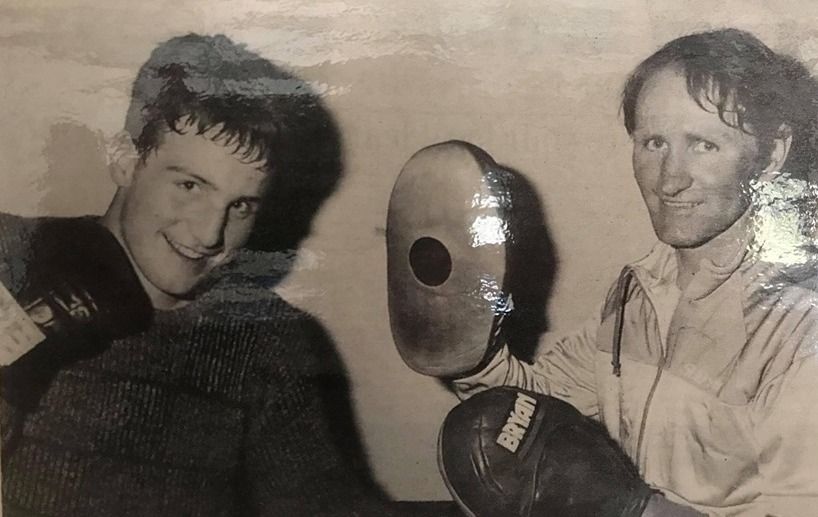
Anthony McFadden on the pads with Dunfanaghy coach Eddie Harkin
*****
FROM the other side of the world, McFadden keeps close tabs on happenings at home.
Regularly in touch with Peter O’Donnell, he’s kept abreast of all the latest.
A long admirer of Andy Lee, he believes the former world champion can bring the best out of Jason Quigley: “Andy is boxing royalty. Jason was a tremendous amateur and he has a great talent. If he takes knowledge from Andy’s background in the Kronk, he’ll do well.”
O’Donnell described the enigmatic McFadden as ‘a man who could pop up anywhere’ and recalls being at a show in Folkstone when ‘the bould McFadden’ appeared. Or the time he spotted him across the arena in Belfast on the night of Jim Rock’s loss to Takaloo in 2003.
“He was a hard puncher,” O’Donnell says. “He had some great nights a boxer and we were delighted to have him at our awards show in Ballyliffin alongside Jason Quigley in 2017.”
McFadden presented some of the awards that night. Those moments jogged the memory too.
“I used to hate a real hard handshake,” he explains.
“A hard handshake would give pain in the hands. As a boxer, your hands are your weapons.”
Tags:







